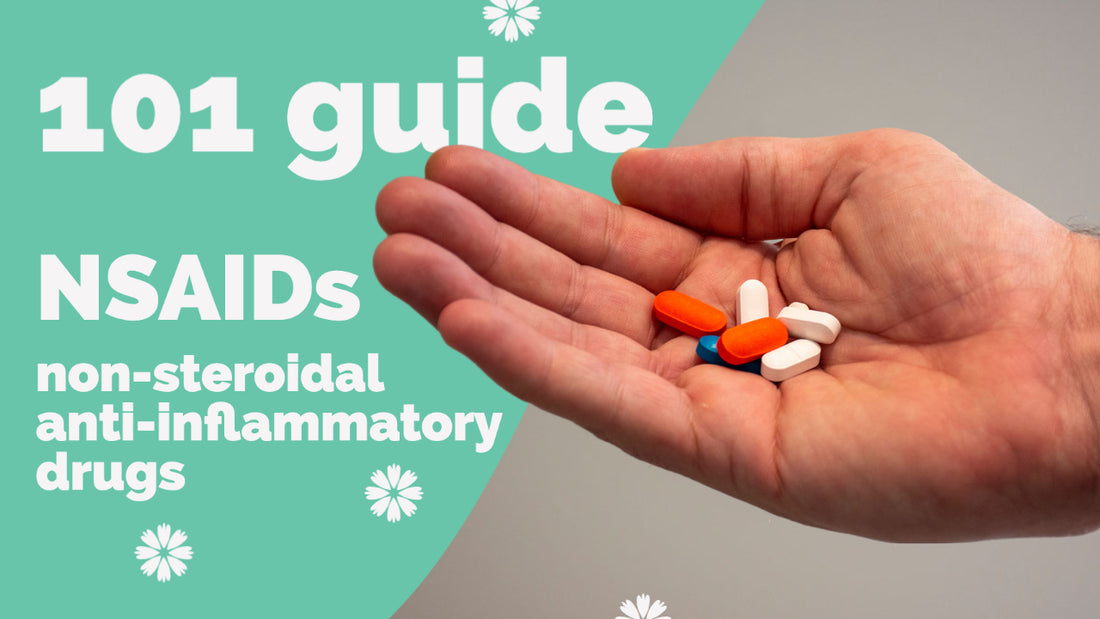
Your 101 guide to NSAIDs: examples, side effects, and alternatives
What are NSAIDs? Are NSAIDs safe? These are some of the first questions that pop into the mind of patients introduced to pain-relief medication. Millions of people take NSAIDs, also known as non-steroidal anti-inflammatory drugs, to relieve headaches, fevers, swelling, stiffness, or arthritis. In this article, we’ll explore everything you need to know about NSAIDs, including examples, meaning, and alternatives to ensure you’re making informed decisions on your medication. Let’s dive in!
What Are NSAIDs?
Every time you take an aspirin to relieve pain or bring down a fever, you take an NSAID. Essentially NSAIDs are drugs used to treat conditions such as arthritis or soothe body pain and come in different forms such as capsules, gels, tablets, injections, or suppositories. Some require a doctor's prescription, while others can be bought from the counter of pharmacies. Here are some NSAIDs examples:
- Ibuprofen
- Aspirin
- Naproxen
- Diclofenac
- Mefenamic Acid
- Celecoxib
- Etoricoxib
- Indomethacin
NSAIDs are more than pain relievers since they help reduce inflammation, prevent blood from clotting, and reduce body temperature. Although most people take them, if you’re older than 65, pregnant, breastfeeding, or with asthma and allergies, you better ask for a doctor’s advice. Additionally, if you’re already taking other medicines, you must be cautious about NSAID consumption — unpredictable reactions and risks of side effects are always a possibility.
Are NSAIDs Safe?
Taking large doses of NSAIDs or taking them for a long time can result in side effects. Some are mild and disappear gradually, while others are more serious and require medical attention. The most frequent NSAIDs side effects are gastrointestinal, affecting your stomach and guts, such as:
- Feeling bloated
- Gases
- Stomach pain
- Vomiting
- Nausea
- Constipation/Diarrhea

Other NSAIDs side effects might also include:
- Dizziness
- Concentration difficulties
- Kidney damage due to increased fluid retention
- Heart attacks and strokes caused by increased blood pressure
Can NSAIDs be addictive? NSAIDs are generally thought to have little to no addictive potential. However, patients who take it for years for chronic pain gradually develop a tolerance to NSAIDs such as ibuprofen. In fact, more than 50 million Americans take over-the-counter pain medication for chronic pain. As a result, they might consume more ibuprofen as intended or prescribed and develop a craving for the substance that turns into an addiction.
What Are Some NSAIDs Alternatives?
Due to NSAID’s side effects, NSAIDs alternatives are usually recommended first. The most common one is paracetamol, which can be bought over the counter and is safe for most people. However, if you’re looking for a more natural alternative, mx naturals offer excellent body balm and lotion pain relievers for the whole family. Especially if you’re dealing with joint pain, back pain, or knee pain or simply looking for a muscle relaxer, these will become your go-to products to soothe and restore you.

NSAIDs and Pain Relief: The Final Verdict
Going on about your life with pain, fever, or headaches sucks. Although NSAIDs are common medication for discomfort, they don’t always come risk-free. So instead, opt for natural alternatives that soothe pain without causing side effects. Hopefully, this article will clarify the NSAIDs meaning and their hazards so that you can choose your medication prudently. For more natural NSAIDs alternatives, check out mx naturals pain relievers that provide the comfort your body needs.
References:
https://www.verywellmind.com/ibuprofen-addiction-symptoms-causes-and-treatment-5215000
https://my.clevelandclinic.org/health/drugs/11086-non-steroidal-anti-inflammatory-medicines-nsaids
https://www.nhs.uk/conditions/nsaids/
https://ioaregenerative.com/blog/is-it-safe-to-take-non-steroidal-anti-inflammatory-drugs-daily#:~:text=Daily%20or%20long%2Dterm%20use,stroke%20by%20increasing%20blood%20pressure.
